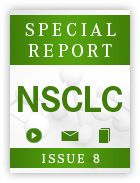Next-Generation Agents in Development for NSCLC
Next generation therapies proven to be highly effective, are in development for patients who have oncogene-driven non-small cell lung cancer (NSCLC), specifically those with alterations in EGFR, ALK, ROS1, and NTRK.
Tony Mok, MD
Next generation therapies proven to be highly effective, are in development for patients who have oncogene-driven non-small cell lung cancer (NSCLC), specifically those with alterations inEGFR, ALK, ROS1,andNTRK, according to a keynote address given by Tony, Mok, MD, at the 2015 International Lung Cancer Congress.
"At this moment, we have a good number of driver mutations that we already know, and there are a lot of exciting developments," explained Mok, a professor in the Department of Clinical Oncology at the Chinese University of Hong Kong.
For patients withEGFR-driven NSCLC, many of the next-generation therapies are aimed at overcoming acquired resistance to frontlineEGFRinhibition. Chief among these therapies are AZD9291 and rociletinib (CO-1686). Both therapies have shown encouraging efficacy in early phase trials, with breakthrough therapy designations from the FDA.
In early July, Clovis Oncology initiated a rolling submission to the FDA for rociletinib in patients withEGFR T790M-positive metastatic NSCLC, based on phase I/II TIGER-X trial. For AZD9291, the pivotal AURA2 study completed enrollment with results expected in early September 2015, according to Mok. In a financial statement, AstraZeneca expressed plans to submit data for AZD9291 in the third quarter of 2015 forT790M-positive NSCLC.
"Even with all of these, there are still a lot of questions that will drive our next studies, such as sequences," Mok said. "There has been so much discussion on immunotherapy, studies will need to look at combining EGFR TKIs with immunotherapy."
For patients withALK-rearranged NSCLC, there are a number of next-generation options that are building on the success seen with crizotinib, Mok noted. In April 2014, ceritinib (Zykadia) gained approval for patients withALK-positive NSCLC following crizotinib. Additionally, alectinib and brigatinib have each received breakthrough therapy designations.
"The study that will change the frontline treatment will be the ALEX trial. This is a head-to-head study of alectinib 600 mg BID, which is a continuous dose, and crizotinib in the first-line," Mok said. "This study is accruing really, really well. Hopefully, within a year or so we will begin to get an answer."
The NCI's ALK Master Protocol is currently exploring various ALK inhibitors in the first- and second-line setting. In the study, patients will be randomized to receive one of four ALK inhibitors in the first-line setting followed by a second agent upon disease progression. This study could provide hints at an optimal sequence for these therapies.
In addition to the more establishedALKand EGFR-driven subtypes, there are a number of therapies currently in development for patients with rare alterations inROS1or NTRK. In this space, crizotinib has received a breakthrough therapy designation from the FDA for patients withROS1-positive NSCLC. Additionally, for those withNTRKalterations, the Trk family TKI entrectinib has demonstrated promise in early phase clinical trials.
In February 2015, entrectinib received an orphan drug designation from the FDA as a treatment for patients with TrkA, TrkB, TrkC,ROS1, andALK-positive NSCLC. In joint findings from the phase I STARTRK-1 and ALKA-372-001 studies, which were presented at the 2015 ASCO Annual Meeting, treatment with entrectinib demonstrated promising activity in this same molecularly defined subset of patients.
In 11 patients across both phase I studies who had not received a prior ALK and/or ROS1 inhibitor and who harbored anNTRK1/2/3,ROS1, orALKalteration, treatment with entrectinib at 400 mg/m2demonstrated an objective response rate of 91%. This dose and patient population has been selected for future study in a phase II trial.
In the 11 patients who met these criteria, all those withROS1alterations had NSCLC (n = 6), and those with ALKalterations had NSCLC (n = 1) and another solid tumor (n = 1). Patients with NTRK1/2/3fusions had NSCLC (n = 1), colorectal cancer (n = 1; CRC), and acinic cell cancer (n = 1). No drug-related serious adverse events were seen with entrectinib in the study.
The phase II STARTRK-2 trial, which is a so-called basket study, is enrolling patients with NSCLC, CRC, and other solid tumors based on molecular profiles (alterations inALK, ROS1,andNTRK1/2/3). Tumors will be analyzed using a potential companion diagnostics that has been developed by the drug's developer, Ignyta (NCT02097810).
"This is actually a registrational study. This is the first time the FDA will allow a basket study as a registration study," explained Mok. "This is very exciting, in a way we're transitioning from the tissue-based to the molecular-based for treatment selection."
Other targets for patients with NSCLC includeBRAF,MET,RET, and a host of other targets, Mok explained. Early data for each of these alterations were presented at the 2015 ASCO Annual Meeting. Based on a phase II study, the FDA granted a breakthrough therapy designation to dabrafenib and trametinib in combination for patients withBRAFV600E-mutant NSCLC.
However, for rare targets likeRET, patient enrollment becomes a concern. For these small subtypes, there are many questions regarding the best way to conduct clinical trials, including the primary endpoints and minimum samples sizes. For these small subtypes, it will take some thinking outside of the box, Mok concluded.

Survivorship Care Promotes Evidence-Based Approaches for Quality of Life and Beyond
March 21st 2025Frank J. Penedo, PhD, explains the challenges of survivorship care for patients with cancer and how he implements programs to support patients’ emotional, physical, and practical needs.
Read More